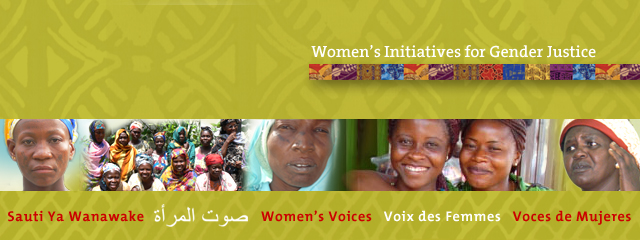Dear Friends,
Welcome to a Special Issue of Women’s Voices, a regular eLetter from the Women’s Initiatives for Gender Justice. In Women’s Voices, we provide updates and analysis on political developments, the pursuit of justice and accountability, the participation of women in peace talks and reconciliation efforts from the perspective of women’s rights activists within armed conflict situations, specifically those countries under investigation by the International Criminal Court (ICC) including Uganda, the Democratic Republic of the Congo (DRC), Darfur, the Central African Republic (CAR I and CAR II), Kenya, Libya, Côte d’Ivoire and Mali.
In addition to Women’s Voices, we also produce a regular legal eLetter, Legal Eye on the ICC, with summaries and gender analysis of judicial decisions and other legal developments at the ICC, and discussion of legal issues arising from victims’ participation before the Court, particularly as these issues relate to the prosecution of gender-based crimes in each of the Situations under investigation by the ICC.
More information about the work of the Women’s Initiatives for Gender Justice and previous issues of Women’s Voices and Legal Eye on the ICC can be found on our website 4genderjustice.org.
This Special Issue highlights the work of the Women’s Initiatives for Gender Justice and our local partners in eastern DRC and introduces our five amazing and courageous focal points in Province Orientale, and North and South Kivu.
Women's Initiatives for Gender Justice: the Democratic Republic of the Congo
The Women’s Initiatives for Gender Justice works with more than 6,000 grassroots partners, associates and members across multiple armed conflicts and has offices or in-country focal points to support our country-based programmes in Uganda, the Democratic Republic of the Congo (DRC), Sudan and Libya.
In June 2004, the ICC Prosecutor opened investigations in the Situation of The Democratic Republic of the Congo, marking the first investigation by the Court. At the time, the investigation was described by the Office of the Prosecutor as focusing on ‘grave crimes allegedly committed on the territory of the [DRC] since 1 July 2002’. In particular, ‘States, international organizations and non-governmental organizations ha[d] reported thousands of deaths by mass murder and summary execution in the DRC since 2002. The reports allege[d] a pattern of rape, torture, forced displacement and the illegal use of child soldiers’.
Since then, seven arrest warrants have been issued against individuals charged with allegedly committing war crimes and crimes against humanity in relation to the DRC Situation. These warrants of arrest relate to:
■ Thomas Lubanga Dyilo (convicted)
■ Germain Katanga (partial conviction, acquitted of rape and sexual slavery charges)
■ Matthieu Ngudjolo Chui (acquitted)
■ Bosco Ntaganda (trial underway, charged with multiple acts of sexual violence)
■ Sylvestre Mudacumura (at large)
■ Callixte Mbarushimana (charges not confirmed by ICC Judges)
The Women’s Initiatives programme in the DRC began in the Ituri region in 2006 with documenting sexual and gender-based crimes and monitoring the armed conflicts in the region and the ICC investigations. Since then, this programme has expanded to incorporate in-country programmes focusing on: access to justice; assistance to victims/survivors; and advocacy with key decision-makers for local law reform and changes in practices and attitudes at the local and provincial levels, as well as national implementation of the Sexual Violence Act, the National Strategy to Combat Violence Against Women, the end to the ongoing conflict in eastern DRC.
These programmes are designed and implemented with local partners- grassroots women’s rights, peace and transitional justice organisations — in North Kivu, South Kivu and Province Orientale.
Women's Initiatives focal points in the Democratic Republic of the Congo
The Women’s Initiatives works with focal points in three provinces affected by ongoing armed conflict, specifically, North Kivu, South Kivu and Orientale Province. WI focal points initiate and lead implementation of our collaborative provincial and thematic gender justice programmes. The Focal Points are all leaders of local organisations and key strategic thinkers within their communities and networks. Their work with the Women’s Initiatives also includes liaising with and coordinating advocacy activities amongst WI’s larger gender justice membership of over 150 organisational and network partners across the three provinces.
Meet our focal points!
Jeanine Bandu Bahati
Coordinator, Encadrement des Femmes Indigènes et des Ménages Vulnérables (EFIM); Women’s Initiatives for Gender Justice Focal Point for North Kivu
Jeanine is the Coordinator of Encadrement des Femmes Indigènes et des Ménages Vulnérables (EFIM), an organisation based in Goma which promotes human rights, including women and children’s rights, by encouraging peace and sustainable development in North Kivu. Jeanine has been the Women’s Initiatives Focal Point for North Kivu since 2009 and collaborates with us on: the sexual and gender-based crimes documentation programme; network and alliance building with local leaders with a focus on religious and faith leaders; advocacy for increased accountability for SGBCs; and strategic screenings of the DRC documentary.
Jeanine Bandu Bahati:
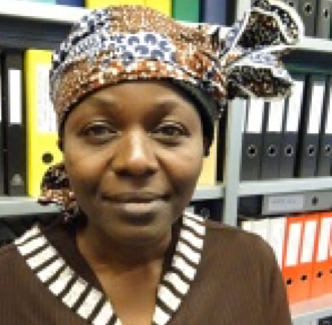 ‘We work with grassroots communities affected by conflict and through our actions, we contribute to the improvement of their lives so that they can thrive in spite of their difficulties. We also intervene in protection and reintegration which is an efficient way of contributing to long-term peace, justice, the independence of women and girls and to change the mentality of the community. During our campaigns and advocacy events, we give hope and show solidarity to those who are most vulnerable. ‘We work with grassroots communities affected by conflict and through our actions, we contribute to the improvement of their lives so that they can thrive in spite of their difficulties. We also intervene in protection and reintegration which is an efficient way of contributing to long-term peace, justice, the independence of women and girls and to change the mentality of the community. During our campaigns and advocacy events, we give hope and show solidarity to those who are most vulnerable.
'Our work with the Women’s Initiatives including the advocacy and strategic screenings of the documentary with decision-makers have proven to be very effective strategies. For example, in 2014, we began working with religious leaders. Before our advocacy and their exposure to the gender justice documentary they weren’t aware of the sexual violence law and the extent of this crime in the areas around Goma. After the screening they wanted a gender justice training workshop and now these faith leaders have become critical allies for us in changing the attitudes within the community. They have also become involved in our advocacy for greater accountability.’
EFIM works with broad groups of community stakeholders including religious leaders, political figures and decision-makers to advocate for the prevention and prosecution of sexual gender based violence in local communities. EFIM also promotes and advocates for the strengthening of the legal system and policies for the protection of women and children, and provides vocational skills training to those most affected by armed conflict including children, especially female former child soldiers.

Photo: EFIM's training with religious leaders – October 2014
Joséphine Malimukono
Director, Ligue pour la Solidarité Congolaise (LSC) ; Women’s Initiatives for Gender Justice Focal Point for National Advocacy
Joséphine is the Director of Ligue pour la Solidarité Congolaise (LSC), an organisation which works to improve the social, legal and economic well-being of women. The Women’s Initiatives has worked with Joséphine since 2009 and in a recently established post reflecting a new phase of our work with national decision-makers, Joséphine was appointed in 2015 as WI’s Focal Point for National Advocacy.
LSC collaborates with the Women’s Initiatives on: the sexual and gender-based crimes documentation programme; monitoring of local mobile courts and the provision of legal representation before these courts for SGBC victims/survivors; network and alliance building with other women’s rights and feminist networks building a community of expertise with respect to documenting gender justice and human rights violations ; advocacy for increased accountability for SGBCs; and strategic screenings of the DRC documentary with key decision-makers in North Kivu. Joséphine coordinates the North Kivu Transit House Project which was launched by LSC and the Women’s Initiatives in 2014. This is an expansion of our original Transit House Project initiated in 2010 with Emérite Tabisha Mongelwa, our South Kivu Focal Point. See below for further information.
Between the two Transit House projects, approximately 800-1000 victims/survivors of sexual and gender-based crimes are supported annually to access medical and psycho-social support. More than 70% are also assisted to access reparative surgeries for rape and other sexual violence-related injuries. In addition to providing assistance for victims survivors to access medical care, since 2014, LSC has provided numerous community information sessions in rural areas on the services provided by the Transit House, awareness and prevention of violence against women, and how to report these incidents to the local legal aid clinics. Almost 8,000 police, traditional leaders, NGOs, victims/survivors and community members have participated in these information sessions which are serving to raise awareness and change attitudes regarding the epidemic levels of sexualised violence committed against girls and women in North Kivu.
Joséphine Malimukono:
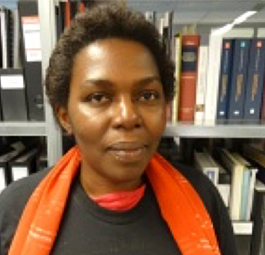 'LSC works to promote human rights and in particular, the rights of women and girls. As such, we provide medical and psychosocial services to women and girls victims/survivors, economical support for women’s activities as well as advocacy to advance women’s rights and the safety of victims/survivors of sexual and gender-based violence. 'LSC works to promote human rights and in particular, the rights of women and girls. As such, we provide medical and psychosocial services to women and girls victims/survivors, economical support for women’s activities as well as advocacy to advance women’s rights and the safety of victims/survivors of sexual and gender-based violence.
'Collaborating with the Women’s Initiatives has enabled us to be more strategic in our programmes and to connect medical services with advocacy and accountability through the mobile courts. Also, the capacity building we have participated in with the Women’s Initiatives has really developed our skills. Decision-makers and other NGOs now consult us about gender justice issues and we have become recognised us as gender experts. This means we can have more influence.'
LSC focuses on income generation activities for women including micro-financing and provides vocational training. LSC has well established support programmes within camps for internally displaced people and monitors the displacement of communities as a result of ongoing insecurity created by armed militia groups and other actors.
For additional information, visit LSC’s website lscrdc.org.
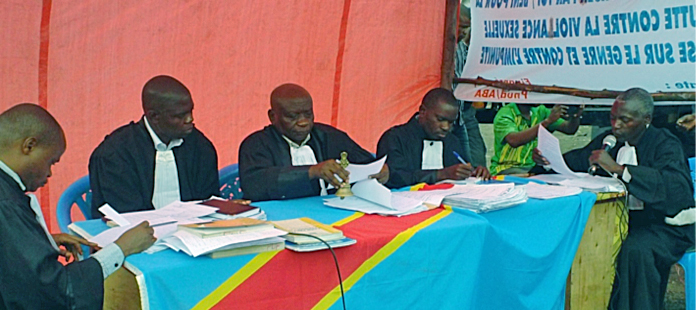
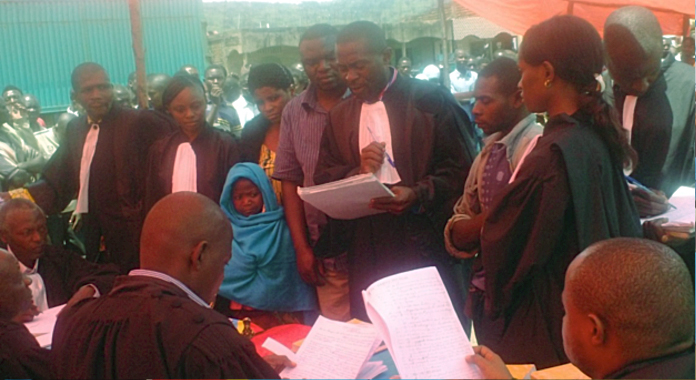
Photos: LSC monitored the mobile court in Rutshuru in April 2015
Emérite Tabisha Mongelwa
Coordinator, Action des Femmes pour les Droits et le développement (AFD) ; Women’s Initiatives for Gender Justice Focal Point for South Kivu
Emérite is the Coordinator of Action des Femmes pour les Droits et le développement (AFD), an organisation which promotes good governance, peace and women’s rights. Emérite has been the Women’s Initiatives Focal Point for South Kivu since 2009 and collaborates with us on several programmes, including: the sexual and gender-based crimes documentation programme; network and alliance building with local leaders including customary leaders, transitional justice networks and women’s rights organisations; advocacy for increased accountability for SGBCs; and strategic screenings of the DRC documentary.
Emérite coordinates the South Kivu Transit House Project initiated by AFD in 2010 and now a collaboration with WI. The Transit House provides a full range of social, psychological and medical assistance to victims/survivors of sexual violence in South Kivu. Since 2012, over 2,000 victims/survivors of sexual and gender-based crimes were supported by this Transit House to access medical and psycho-social support of which over 70% are also assisted to access reparative surgeries for rape and other sexual violence-related injuries. As noted above, the project was expanded in 2014 with the launch of a second Transit House in North Kivu.
In addition to providing assistance for victims/survivors to access medical care, since 2014, AFD has provided 60 community-based information sessions on the services provided by the Transit House, awareness and prevention of violence against women, and how to report these incidents to the local legal aid clinics. Almost 1,200 police, traditional leaders, NGOs, victims/survivors and community members have participated in the information sessions.
Emérite Tabisha Mongelwa:
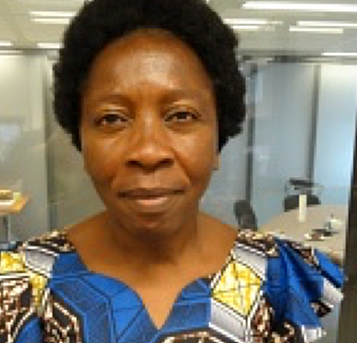 ‘AFDs work in South Kivu, to provide psychological and medical assistance and referrals as well as referrals to training and livelihood programmes for victims/survivors of sexual and gender-based violence. We advocate for a better status of rural women and girls, for changes in traditional and customary practices and for women’s participation in customary decision-making processes. ‘AFDs work in South Kivu, to provide psychological and medical assistance and referrals as well as referrals to training and livelihood programmes for victims/survivors of sexual and gender-based violence. We advocate for a better status of rural women and girls, for changes in traditional and customary practices and for women’s participation in customary decision-making processes.
'Documenting sexual and gender-based crimes is hard work. During the war our advocacy was done without documentation data. Women recognised we needed training on documentation to retain the history of what happened. It is essential as activists. Our documentation training with the Women's Initiatives for Gender Justice has really helped us to connect our advocacy with the documentation data and now even the government is listening.
'AFD also promotes education and peace, including through training women on their socio-economic and cultural roles. These capacity building activities reinforce women's ability to promote, protect and safeguard women’s rights.’
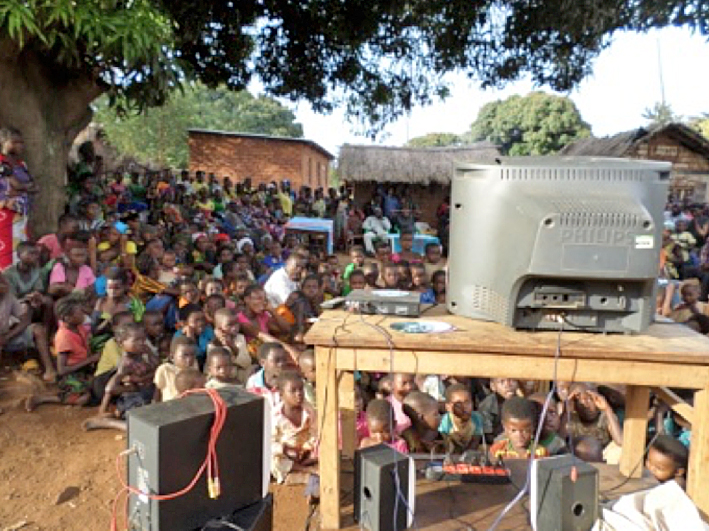
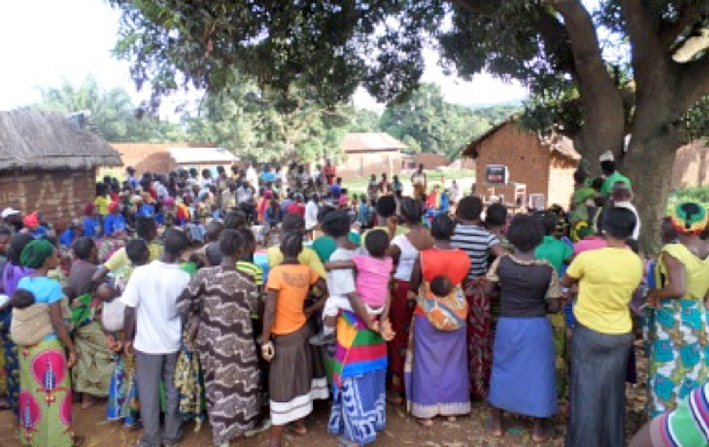
Above: Public screening held by AFD in March 2015
Stella Yanda Bililo
Executive Secretary, Initiatives Alpha; Women’s Initiatives for Gender Justice Project Focal Point, South Kivu
Stella is the Executive Secretary for Initiatives Alpha, an organisation working to promote and protect the rights of women and children. The Women’s Initiatives has worked with Stella since 2009. Initiatives Alpha collaborates with the Women's Initiatives on: the sexual and gender-based crimes documentation programme; advocacy for increased accountability for SGBCs; strategic screenings of the DRC documentary; network and alliance building with a focus on youth networks as well as local leaders including customary leaders in rural areas. More recently, this collaboration has extended to monitoring and following up with the judiciary on specific SGBCs cases in Bukavu.
Stella Yanda Bililo:
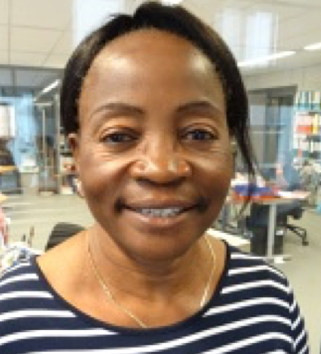 ‘Initiatives Alpha was created after realising a lack of focus on access to justice from organisations accompanying victims/survivors of sexual and gender-based violence. The organisation works to bring women from South Kivu and the DRC to become actors of their growth and capable of defending their civil, social, political, economic and cultural rights. ‘Initiatives Alpha was created after realising a lack of focus on access to justice from organisations accompanying victims/survivors of sexual and gender-based violence. The organisation works to bring women from South Kivu and the DRC to become actors of their growth and capable of defending their civil, social, political, economic and cultural rights.
'Documentation is very important. We hadn't really done it before we started working with the Women's Initiatives and now we are able to do it on a large scale. It is intensive work and requires a lot of skills. It helps to dissuade perpetrators if they know that their actions might be exposed. The documentation also provides us with a database for law reform and strengthening the justice system.
'One of the aspects we have learnt in working with the Women’s Initiatives is the benefit of not just working on one strategy. With the Women’s Initiatives we are working on multiple-strategies involving multiple disciplines, all of which work together. If we don’t look at all of the human, social and economic dimensions, we can’t have the same impact. This multi-strategy approach is more effective.'
Initiatives Alpha works with large groups of community stakeholders including local civil society, customary leaders and local authorities to educate and advocate for the prevention of sexual gender-based violence in local communities and for better access to medical services and economic development activities for victims/survivors. Initiatives Alpha plays an important role monitoring the justice and security institutions in South Kivu.

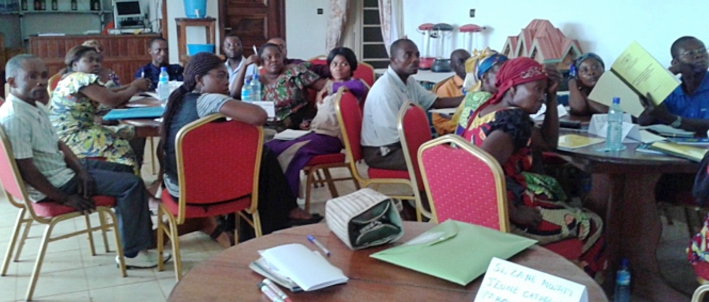
Above: Initiatives Alpha training workshop in June 2015
Claudine Bela Badeaza
Director, Centre d’Education et de Recherche pour les Droits des Femmes (CERDF) ; Women’s Initiatives for Gender Justice Focal Point for the Orientale Province
Claudine is the Director of the Centre d’Education et de Recherche pour les Droits des Femmes (CERDF), an organisation aimed at defending women and children’s rights through monitoring, lobbying, advocacy and through training on feminine leadership and political participation.
Claudine has been the Women’s Initiatives Focal Point for Province Orientale since 2009 and collaborates with us on: the sexual and gender-based crimes documentation programme; advocacy with the judiciary and local police regarding greater accountability for SGBCs; and strategic screenings of the DRC documentary. As an extension of the documentary screenings/advocacy events, in 2015, CERDF established four NGO focal points located throughout Province Orientale whose task is to report sexual violence cases. With this information CERDF is developing a database of these incidents and utilises this material in its advocacy with the police and judiciary.
Claudine Bela Badeaza:
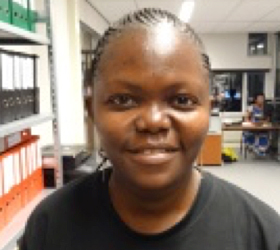 ‘CERDF ensures the psychosocial and legal assistance to women and children victims/survivors of sexual violence and focuses particularly on documenting sexual and gender-based crimes under the jurisdiction of the ICC and domestic courts. The work carried out by CERDF gives a voice to victims/survivors of sexual and gender-based crimes and permits them to gain their dignity back. Thus, women slowly get involved in public life. ‘CERDF ensures the psychosocial and legal assistance to women and children victims/survivors of sexual violence and focuses particularly on documenting sexual and gender-based crimes under the jurisdiction of the ICC and domestic courts. The work carried out by CERDF gives a voice to victims/survivors of sexual and gender-based crimes and permits them to gain their dignity back. Thus, women slowly get involved in public life.
'The authorities use to reproach us for advocating about sexual violence issues without having evidence. The documentation training with the Women’s Initiatives and the collaborative documentation programme enables us to provide the data about these crimes and it allows for change. The authorities now know that if they don’t act they will be criticised by organisations. Documentation also supports us to record what has happened, which is important in a culture that is more verbal and hasn’t relied on written material. It also helps survivors.’
In addition to its collaborations with the Women's Initiatives, the CERDF focuses on monitoring the political, social and security situation and potential impact on women and the perpetration of sexual and gender-based crimes in the community. CERDF directly impacts on the work of national and provincial decision-makers with its advocacy on the prevention of gender-based violence. It also provides training and direct assistance to victims/survivors.
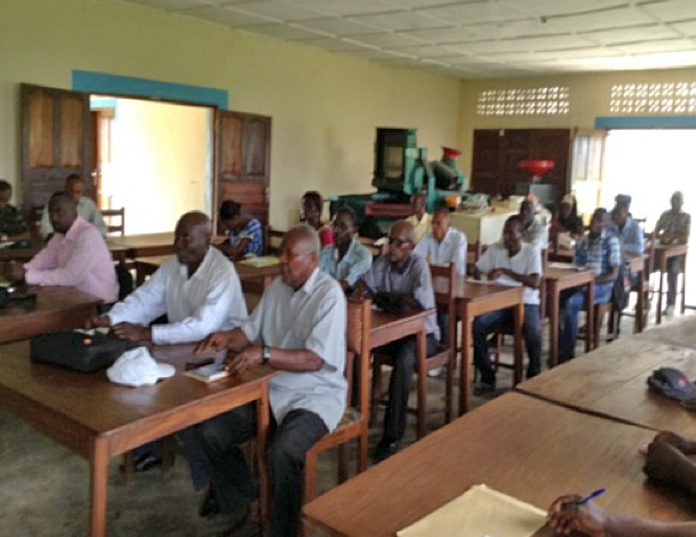
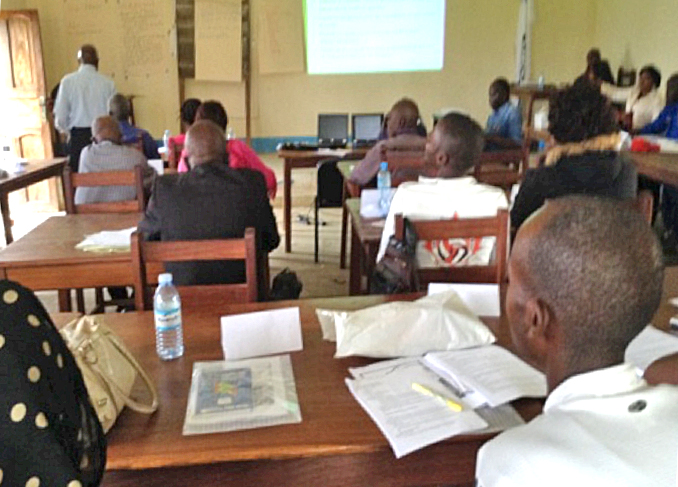
Above: Participants to the screening held in April 2015
Some additional resources:
■ Read more about Women’s Initiatives and partners advocacy video here
■ Read an interview with Women’s initiatives focal point in South Kivu, Emérite Tabisha here
■ Read Women’s Initiatives focal points and partners’ reaction to the appointment of a Presidential Advisor on Sexual violence and Child Recruitment in the DRC here
■ View our Facebook posting on our focal points and partners meeting with DRC Presidential Advisor on Sexual violence and Child Recruitment here
■ Read Signing by Women’s Initiatives’ DRC partners of an open letter to Mary Robinson, United Nations Special Envoy for the Great Lakes Region of Africa here
■ Read about the 2012 conflict in eastern DRC here
■ Read about the mobile courts in the DRC here
■ Read about the 2011 conviction of a commanding officer for mass rape in South Kivu here
|
